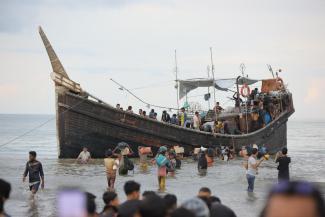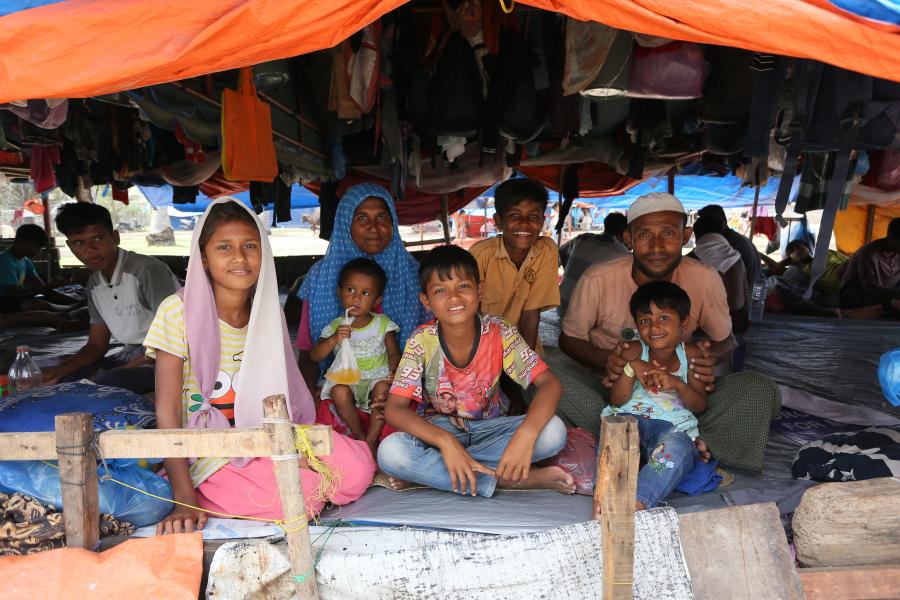Population figures | 2021 - 2025
2025 situation overview
A surge in the conflict in Myanmar since October 2023 has increased displacement within the country and outflows across the border, and the protection and humanitarian outlook for 2025 appears increasingly bleak and likely to worsen. The impact has been felt across the region and is triggering onward movements of refugees, requiring the application of a route-based approach by UNHCR and partners.
Amid the escalating conflict and widespread violence, UNHCR is urging all States to grant civilians fleeing Myanmar access to their territories, to uphold the right to seek asylum, and to adhere to the principle of non-refoulement, in accordance with the “Guidance note on the international protection needs of people fleeing Myanmar”. In tandem, UNHCR will advocate for comprehensive, regional solutions by collaborating with partners in the region and beyond to find sustainable solutions and outcomes for Rohingya and other refugees from Myanmar. Strengthening strategic partnerships with local NGOs, civil society, and faith-based organizations will remain a priority to deliver conflict-sensitive, life-saving assistance, including core relief items to 620,000 people, while also covering protection and camp management, with over 23,000 people receiving shelter assistance. Some 100,000 people will benefit from quick-impact projects designed to expand access to basic services, bolster self-reliance and resilience, and promote peaceful co-existence between both displaced and host communities.
In Bangladesh, seven years after the large-scale arrival of Rohingya refugees, UNHCR will advocate strongly for solutions for the Rohingya, emphasizing the critical importance of upholding their right to return in safety and dignity.
Working closely with the Government of Bangladesh and its partners, UNHCR will seek to sustain robust support to meet the ongoing needs of around 1 million Myanmar refugees and asylum-seekers in Cox’s Bazar and on Bhasan Char Island, focusing on essential services such as shelter, health care, education and protection. At the same time, across the region, UNHCR will accelerate efforts to expand third-country solutions by strengthening resettlement processing capacities and advocating for enhanced support for complementary pathways.
In 2025, UNHCR will seek to increase resettlement submissions from Bangladesh to the United States, Canada, Australia and Ireland and increase the range of resettlement countries offering solutions to refugees in Bangladesh, such as family reunification, scholarships, and labour mobility schemes. Building refugees’ resilience with skills development and livelihoods will contribute to the sustainability of return and third-country solutions.
UNHCR will prioritize access to legal identity for all Rohingya by supporting all States in the region (including countries of origin, transit and destination) to achieve universal birth registration and registration of other vital events. UNHCR will advocate for the removal of barriers faced by displaced and stateless people in accessing civil registration and identity documentation, and promoting legislative reforms to prevent and reduce statelessness.
A rise in irregular maritime movements poses significant risks to the lives of refugees and asylum-seekers. Working closely with the Bali Process, ASEAN, and the inter-agency Regional Protection Group, UNHCR will call for greater regional coordination and responsibility-sharing among States to address these dangerous journeys, including through sustained advocacy and joined-up route-based approaches that include protection at sea as one of the key pillars. This will include advocating for predictable disembarkation arrangements and safe, legal pathways to protection so that those in distress at sea can reach safety without delay.
UNHCR will develop tools to monitor online narratives and initiatives to respond to a rise in online misinformation, disinformation and hate speech targeting Rohingya in countries along the route, while strengthening partnerships with the private sector and civil society. UNHCR will work towards advancing the pledges made under the Rohingya multi-stakeholder pledge for resilience and solutions at the 2023 Global Refugee Forum. UNHCR will prioritize a whole-of-government approach, driving sustainable responses and advocating for supportive policy environments to reinforce effective implementation.
Recognizing climate change as a critical driver of displacement and humanitarian needs, UNHCR will prioritize integrating climate adaptation and resilience-building measures into its response wherever possible, focusing on both immediate needs and long-term solutions for the Rohingya and host communities.
Financial overview
Rohingya refugees risk dangerous sea route to Indonesia in search of safety and freedom
By Mitra Salima Suryono in Aceh, Indonesia
Jannatara, 18, was six months pregnant and recently widowed when she boarded a boat from Bangladesh where she had been living in one of the sprawling camps for Rohingya refugees since fleeing persecution and violence in Myanmar in 2017.
The centre engages 130 Rohingya women to make products such as grocery bags, nursery bags for tree planting, and products for other humanitarian aid agencies.
Read the story










